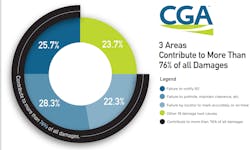Common Ground Alliance (CGA) launched its “50 in 5” initiative to reduce damages to critical underground utilities by 50 percent in five years.
According to CGA’s Damage Information Reporting Tool (DIRT) Report, the annual rate of damages to buried infrastructure in the U.S. has remained stagnant for most of the last decade and costs the U.S. $30 billion every year. Each of the hundreds of thousands of dig-ins to underground utilities that occurs annually has the potential to cripple communities and businesses by cutting them off from critical services, cause injury or even loss of life, according to the group.
What is the “50 in 5” challenge?
The initiative aims to bring damage prevention advocates together around a targeted set of strategic, data-driven priorities. It focuses on three areas:
- Effective and consistent use of 811: Despite DIRT data and market research that indicate that 811 awareness is very high—particularly among professional excavators—60 percent of damages to underground utilities are caused specifically by professional contractors not contacting 811 prior to digging. CGA is unveiling a refreshed 811 tagline and animated logo this spring.
- Key excavator practices (potholing, maintaining clearance, etc.): Potholing (test holing) to confirm the location of buried utilities and then maintaining the required clearance around those utilities, along with miscellaneous improper excavation practices, are key steps for protecting the integrity of underground infrastructure, according to CGA. Targeted and consistent excavator outreach around CGA Best Practices 5.19 and 5.20 could reduce damages to buried infrastructure, it said.
- Accurate, timely utility locating: According to CGA, improving the accuracy of facility maps and implementing electronic white-lining would help locators complete their work more quickly and accurately. Efforts like a Minnesota coalition’s pilot program to make 811 ticket-level facility map visualizations available to locators and other 811 system end users have the potential to increase locating efficiency, it says.
“The Common Ground Alliance’s damage prevention stakeholders have worked diligently to make communities safer by reducing dig-ins—but we are now at an inflection point as an industry,” said Sarah K. Magruder Lyle, president/CEO, in a statement. “I encourage every stakeholder to meet our ‘50 in 5’ challenge and commit their organizations to making bold choices and investments as we look to cut annual damages in half by 2028. With the massive funding authorized by the Bipartisan Infrastructure Law and the pace of current construction activity, now is the time for the industry to seriously examine how we can make the next dramatic reduction in annual damages and protect critical infrastructure.”
Source: Common Ground Alliance
About the Author
Rod Sutton
Sutton served as the editorial lead of Construction Equipment from 2001 through 2025.
